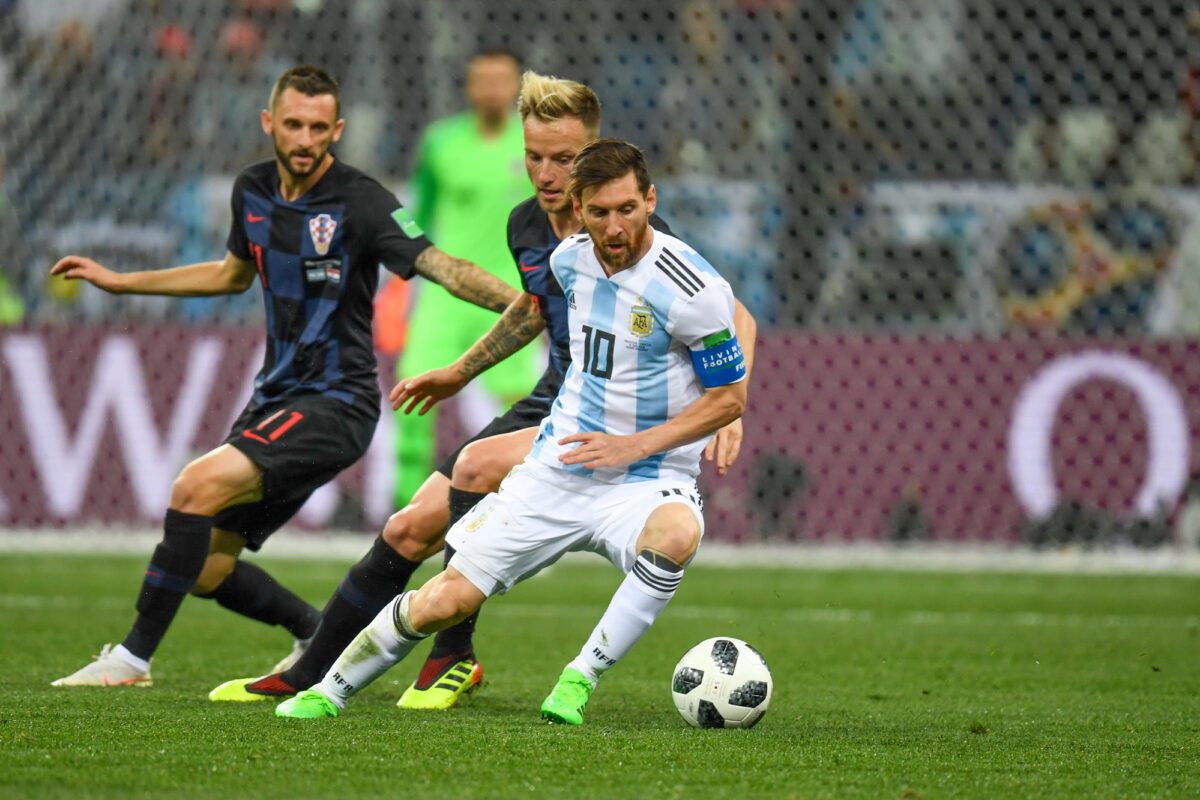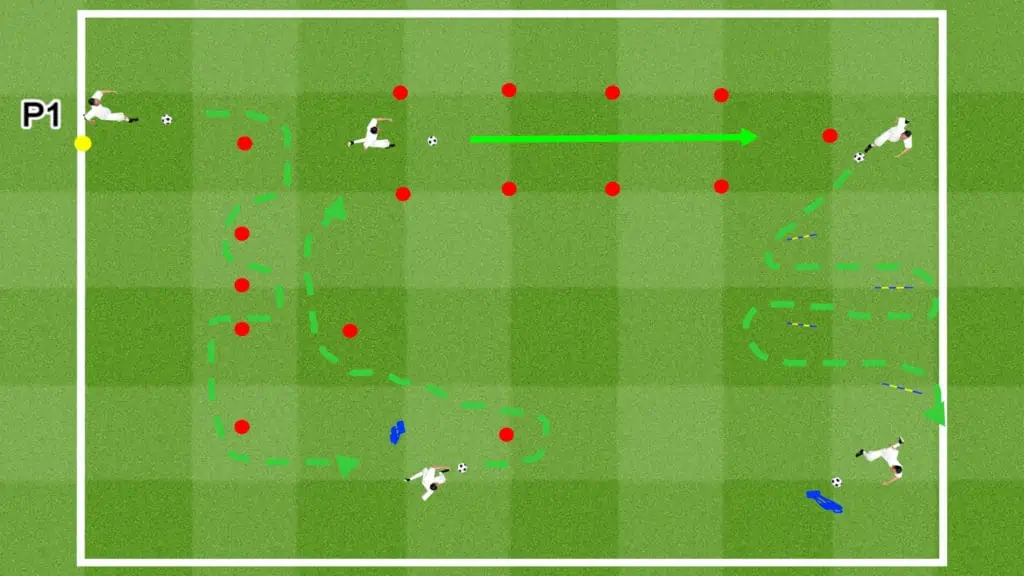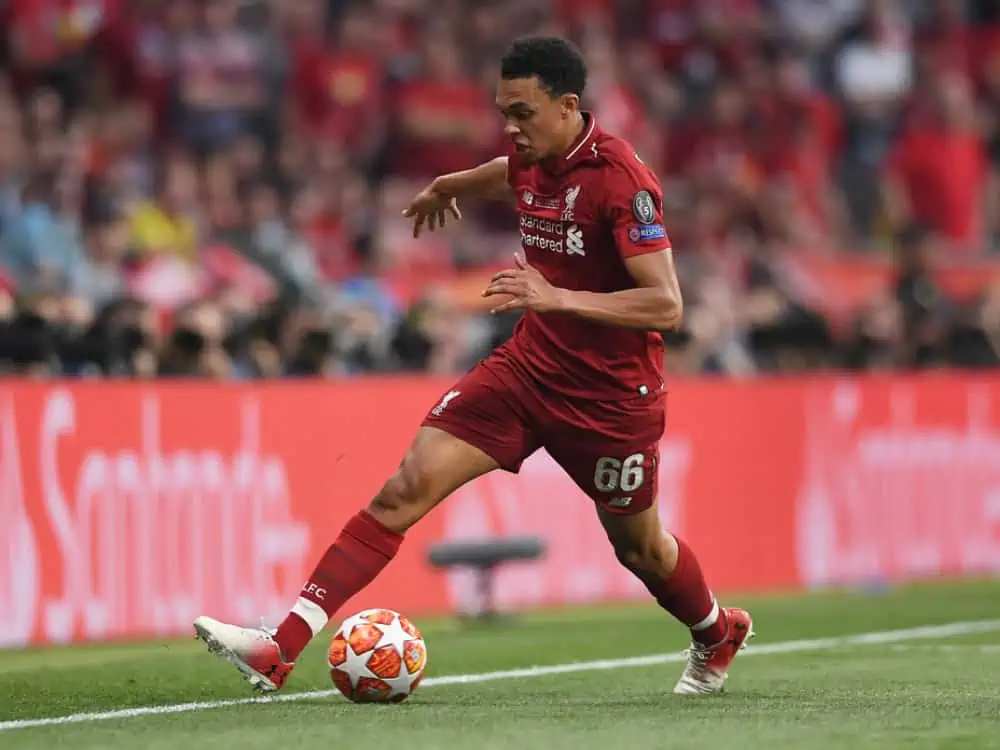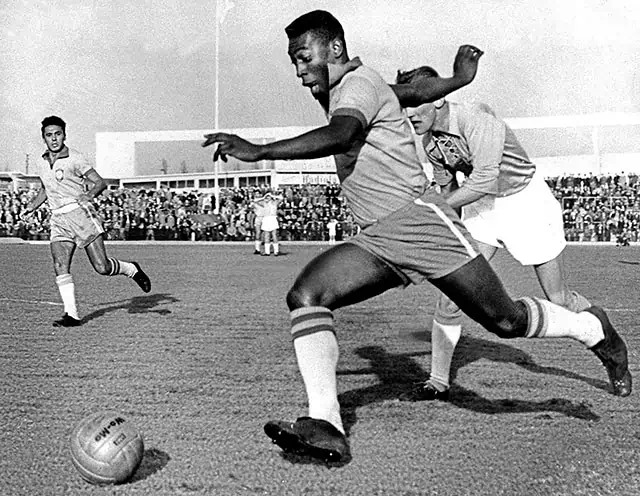Share the post "Dribbling in Soccer: Mastering Messi’s Techniques to Elevate Your Game"
Have you ever wondered how Lionel Messi confuses opponents with a ball at his feet? Messi’s dribbling skills are the result of years of work and game knowledge. Soccer players can learn to touch the ball with deftness and create game-changing moments using his technique.
I’ve studied Messi’s dribbling style as a soccer player and fan. He can easily handle tight defenses due to his incredible ball control. Messi can make snap judgments and change directions, leaving defenders behind, by keeping the ball close.
Mastering these dribbling tactics can improve a player’s performance. Movement efficiency, reading the play, and confidence in your ability to hold control are more important than showy tricks or flicks. Messi’s fundamentals are a great location to start improving your dribbling.

- The Basics of Dribbling in Soccer
- Adopting Messi's Dribbling Style
- Essential Dribbling Drills and Exercises
- Applying Dribbling Skills in a Game
- Advanced Dribbling Techniques
- Maintaining Physical Fitness and Agility
- Psychological Aspects of Dribbling
- Famous Dribblers and Their Styles
- Incorporating Dribbling into Team Play
- Gear and Equipment for Optimal Dribbling
- Future of Dribbling
The Basics of Dribbling in Soccer
Dribbling is the art of controlling the ball at your feet while moving around the field. It’s essential for taking on defenders, creating space, and maintaining possession.
Watch our video about dribbling to see how it’s done;
Understanding Dribbling Mechanics
When I dribble, I make sure to keep the ball close to my feet. This gives me better control and allows me to make quick movements. Using different parts of the foot such as the inside, the outside, and the sole is key to maneuvering around opponents. Here’s how I utilize each part:
- Inside of the foot: Great for close control and shielding the ball.
- Outside of the foot: Helpful for quick changes in direction.
- Sole of the foot: Useful for stopping the ball or changing pace.
I also pay attention to my stance and balance. I keep my body between the ball and the defender, stay on my toes, and am always ready to change direction.
Key Dribbling Rules to Remember
While dribbling, I follow the basic soccer rules.
Here’s a simple list I follow:
- Touch: Each touch keeps the ball within playing distance.
- Space: I look for open space to advance the ball or draw in defenders.
- Vision: I keep my head up to be aware of my surroundings and to spot passing opportunities.
By following these principles, I know that my dribbling is effective.
Adopting Messi’s Dribbling Style
In my journey to dribble like soccer icon Lionel Messi, I’ve discovered the importance of precision footwork, close ball control, deceptive body feints, and the ability to change pace abruptly.
Studying Messi’s Footwork
I watch clips of Messi’s games focusing on his quick feet. He makes light, rapid touches primarily using the inside of his foot. I mimic these movements in practice, constantly shifting my weight to prepare for sudden changes in direction.
Mastering Close Ball Control
To handle the ball like Messi, I train myself to keep the ball no more than a few inches from my foot. This requires intense concentration and hours of practice dribbling through cones, ensuring the ball feels like an extension of my body.
Perfecting the Body Feint
Messi’s ability to mislead opponents with his body is unmatched. I work on my body feints, making sharp movements with my shoulders and hips to throw defenders off balance. Importantly, I always keep my eyes on the defender’s feet to anticipate their next move.
Learning the Art of Changing Pace
Finally, I fine-tune my acceleration. Messi is known for his explosive bursts of speed after a slow approach to throw off defenders. I practice transitioning from a jog to a full sprint with the ball at my feet, catching imaginary defenders by surprise.

Essential Dribbling Drills and Exercises
Improving your dribbling skills like Messi involves consistent practice with a variety of drills. Here, I’ll guide you through some focused exercises that cater to individual skill enhancement, partner-based interactivity, and obstacle work to mirror in-game situations.
Solo Drills for Skill Improvement
Cone Weave
To sharpen my close ball control, I weave through a line of cones using just a few touches. The aim is to maintain a rhythmic pattern while keeping the ball close.
- Tap and Go
I begin this drill at the halfway line, tapping the ball forward with the top of my foot with every step and ensuring not to let the ball get too far ahead of me. This simple movement helps enhance touch control and precision.
Partner Drills for Interactivity
1-on-1 Gate Dribbling
In this competitive drill, I partner up with a friend, where one of us plays offense trying to dribble through laid out ‘gates’ while the defender attempts to steal the ball. The shifting roles help us develop offensive and defensive dribbling skills.
- Shadow Dribbling
I use this drill to mimic in-game pressure by having my partner shadow my movements closely. It’s an excellent way to practice protecting the ball and changing direction quickly under pressure.
Dribbling Courses and Obstacle Work
Timed Dribble Courses
Setting up a dribble course with various obstacles allows me to improve my speed and agility with the ball. I time my runs to track progress and push my pace while maintaining control.
- Messi’s Zigzag Run
I emulate the great Messi with tight zigzag runs around a series of cones, focusing on quick, sharp cuts and acceleration with the ball, much like he does in matches to evade defenders.
Applying Dribbling Skills in a Game
When I try to dribble like Messi, it’s about more than just the fancy footwork; it’s about knowing when and where to dribble, handling defensive pressure, and creating scoring chances.
Spatial Awareness and Decision Making
I always keep my head up to maintain a broad view of the field, allowing me to make smart decisions. By scanning the area, I can spot gaps in the defense and choose the best path forward. Quick thinking and fast feet are essential. When I see an open space, I don’t hesitate to exploit it with a well-timed dribble.
- Scan Continuously: Watch for movement of teammates and opponents.
- Choose Wisely: Decide whether to pass, dribble, or shoot based on the situation.
Coping with Defensive Pressure
In tight situations where defenders close in, staying calm and composed is my strategy. I make use of quick changes in direction and speed to disorient opponents. Shielding the ball and using body feints can also create the necessary space to continue my run or find a passing lane.
- Confident Control: Maintain close ball control.
- Quick Adaptation: Be ready to alter dribbling speed and direction.
Creating Opportunities through Dribbling
Dribbling isn’t just about retaining possession; it’s about actively creating scoring opportunities. By drawing defenders in, I can create space for teammates or use dribbling skills to bypass opponents and open up shooting chances. It’s about finding the balance between keeping possession and taking calculated risks to move into more dangerous positions.
- Drawing a Crowd: When multiple defenders focus on me, others become free.
- Calculated Risks: I know when the potential reward of a dribble outweighs the risk.

Advanced Dribbling Techniques
In my journey to play soccer like Messi, I’ve focused on perfecting advanced dribbling techniques that can create space and beat defenders with finesse.
Fintas for Disorienting Opponents
Fintas, or feints, are my go-to when I need to throw defenders off balance. Here’s how I execute them effectively:
- Body Feint: I lean into one direction but push the ball into another to mislead defenders.
- Step-Over: I loop my foot over the ball quickly, causing the defender to anticipate a ball direction that I’m not actually committing to.
Executing fintas convincingly is all about selling the fake move with my entire body, not just my feet.
La Pelopina and the Marseille Turn
Now, let’s talk about two sophisticated moves that I’ve incorporated into my gameplay:
- La Pelopina:
- Setup: As the defender approaches, I drag the ball back slightly with the sole of my foot.
- Execution: I spin my body opposite to the direction of the drag while using my other foot to flick the ball past the opponent.
- The Marseille Turn (commonly known as the Zidane Roulette):
- Setup: I lure the defender in by seemingly offering them an opportunity to tackle.
- Execution: I drag the ball with one foot while wrapping that same leg around the ball to shield it, completing the turn with a 360-degree spin to exit away from the defender.
Both moves require a seamless blend of agility, balance, and timing to ensure that opponents are left behind while I maintain possession.
Maintaining Physical Fitness and Agility
To dribble like Messi, I find it crucial to focus on two main fitness components: strength and agility. My routine emphasizes these to improve my dribbling skills.
Strength Training for Dribblers
Core Strength: I maintain a strong core through exercises like planks and Russian twists. A solid core grants me stability during quick changes of direction.
Leg Strength: Squats and lunges form the bulk of my leg workout. Strong legs give me the power to shield the ball and maintain my balance against defenders.
Agility Drills Specific to Dribbling
Cone Drills: I set up cones and practice weaving through them with the ball. This enhances my footwork and simulates in-game situations.
Ladder Drills: Using a speed ladder, I perform various foot patterns to improve coordination. Quick feet are essential for keeping the ball under close control.
Psychological Aspects of Dribbling
In soccer, the mental game is just as important as the physical one. Here’s how I tackle the psychological challenges of dribbling.
Building Confidence on the Ball
Confidence is the cornerstone of my dribbling style. Here’s how I build it:
- Practice: I spend countless hours on the ball, which helps me gain muscle memory and trust in my abilities.
- Positive Self-Talk: Whenever I face a defender, I remind myself of my skills and past successes to boost my confidence.
It’s not just about having the skills; it’s believing in them that makes the difference. I trust my feet to do the job, and that belief helps me keep the ball glued to my boots when it matters most.
Maintaining Focus under Pressure
Keeping concentrated under the barbs of opponents and the roar of the crowd is a skill in itself:
- Goal Visualization: Before a match, I visualize successful dribbles, which primes my mind for the task ahead.
- Breathing Techniques: I use controlled breathing to maintain my composure when the pressure is on.
The key is to treat each moment on the field as the most important one. I hone in on the ball, the space, and my movement, drawing away from the distraction and pressure around me. This focus transforms the chaos into clarity and allows me to make the right moves.

Famous Dribblers and Their Styles
In exploring the art of soccer dribbling, I’m fascinated by the unique styles of famous dribblers, from past legends to contemporary maestros and promising newcomers.
Legends of the Past
- Diego Maradona: His ‘Hand of God’ aside, Maradona’s dribbling is more divine than devilish, characterized by his low center of gravity and astounding bursts of acceleration.
- Pele: The Brazilian king of soccer wasn’t just a prolific scorer; his dribbling was a blend of elegance and unpredictability, often leaving defenders at a standstill.
Contemporaries and Rising Stars
- Lionel Messi: My focus is on Messi’s close ball control and rapid direction changes executed with almost casual brilliance. Key to his style are his lightning-quick feet and low dribbling stance.
- Neymar Jr.: He exhibits a flamboyant dribbling style, marked by theatrical flair and exceptional skill in one-on-one situations.
- Kylian Mbappe: Although newer on the scene, Mbappe is known for his explosive speed and sharp dribbling that often cuts through defenses like a knife through butter.
Incorporating Dribbling into Team Play
Dribbling in soccer isn’t just about individual skill; it’s also about how to harmoniously blend these moves into team play. I’ll share how to combine with teammates and use dribbling strategically.
Combining with Teammates
When I have the ball at my feet, my first thought is how I can use my dribble to create opportunities for my team. Here’s how I do it:
- Quick One-Twos: I initiate a rapid one-two pass with a teammate, using my dribble to draw in defenders before releasing the ball.
- Overlap Runs: As I drive forward, I’m aware of teammates making runs. A well-timed dribble can draw defenders and open up space for an overlapping teammate to receive the ball in a more dangerous position.
- Changing Play: Sometimes, I use my dribble to switch the point of attack. I carry the ball across the field, from one flank to the other, to exploit unmarked space and give teammates a chance to move and receive the ball.
Dribbling as a Strategic Tool
My dribbling isn’t just random. It’s a thought-out strategic tool that serves two main purposes:
- Creating Space: By dribbling at defenders, I force them to move and adjust, creating space for myself and my teammates.
- Time Management: I use my dribble to control the pace of the game. If we’re leading and want to maintain possession, I dribble conservatively to keep the ball and run down the clock. When we need to score, I dribble more aggressively, aiming to penetrate the defense and create chances.
Gear and Equipment for Optimal Dribbling
To dribble like Messi, it’s important to use the right gear and equipment. These tools can significantly enhance my control and technique on the field.
Selecting the Right Footwear
When I’m choosing soccer cleats, the fit should be snug, offering a tactile feel for the ball. Lightness and flexibility are key for swift movements, while the stud pattern should match the playing surface to provide adequate grip and agility. Here’s a breakdown of what to consider:
- Material: Modern cleats are made from leather or synthetic materials. Leather offers a more natural feel, while synthetics often provide better durability and water resistance.
- Soleplate and Stud Configuration: Options include firm ground (FG), soft ground (SG), and artificial ground (AG). FG cleats are versatile for well-maintained grass fields, SG for wet and muddy conditions, and AG for artificial turf.
- Fit: A proper fit is crucial. My cleats should be snug but not tight, allowing natural foot movement without internal slipping.
Training Cones and Dribbling Aids
Setting up a practice course with training cones helps me work on agility and precision with the ball. Dribbling aids like cones and poles can simulate defenders and obstacles, which is great for practicing changes in direction and speed. Here’s a simple setup I use:
- Arrange cones in straight lines, zig-zags, or circles for varied dribbling paths.
- Include different dribbling aids, such as poles or mini hurdles, to challenge my footwork and control.
By incorporating these tools into my training routine, I develop the touch, control, and agility needed to dribble effectively on the field.
Future of Dribbling
As I’ve explored the techniques and practiced dribbling, I’ve realized the importance of close ball control and nimble changes in pace. Messi’s example highlights the effectiveness of these skills in evading defenders and creating opportunities.
Looking ahead, I anticipate technology will further enhance training methods. Virtual reality (VR) and augmented reality (AR) could simulate match scenarios, allowing players to sharpen their dribbling in immersive environments.
Here’s a quick breakdown of key takeaways:
- Practice: It’s imperative to dedicate time to refine ball control.
- Change of Pace: Acceleration can confuse opponents, creating space.
- Body Positioning: Using your body to shield the ball can retain possession.
For aspiring players:
- Utilize modern technology like VR for situational practice.
- Study professional players’ games and mimic their movements.
- Always seek new techniques to stay ahead of the game.
Dribbling is not just about maneuvering the ball, but also about anticipating opponents’ moves and reacting swiftly. As the game evolves, so too will dribbling tactics, influenced by emerging technologies and innovative training protocols. Adapting and adopting these changes is key for not just maintaining, but excelling in dribbling proficiency.
Share the post "Dribbling in Soccer: Mastering Messi’s Techniques to Elevate Your Game"
Joel is a seasoned soccer journalist and analyst with many years of experience in the field. Joel specializes in game analysis, player profiles, transfer news, and has a keen eye for the tactical nuances of the game. He played at various levels in the game and coached teams - he is happy to share his insight with you.



